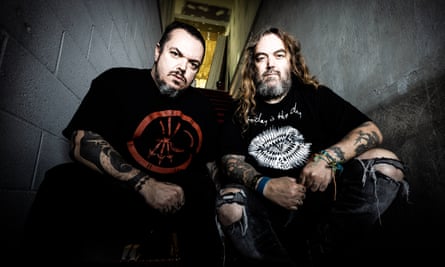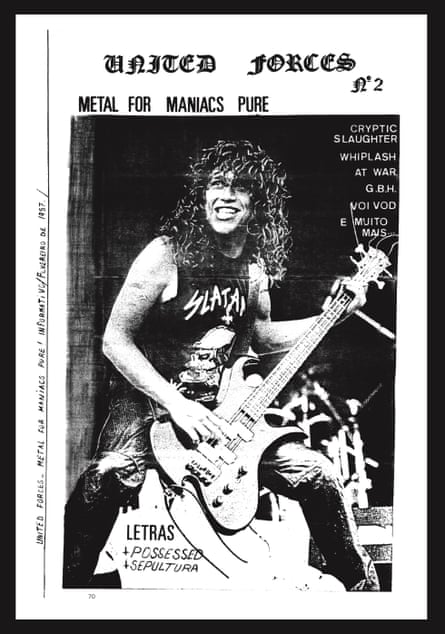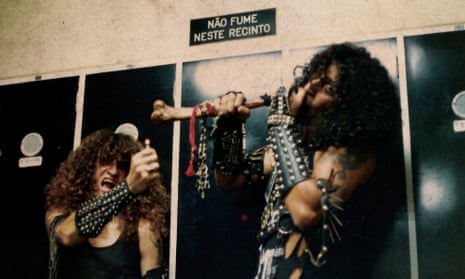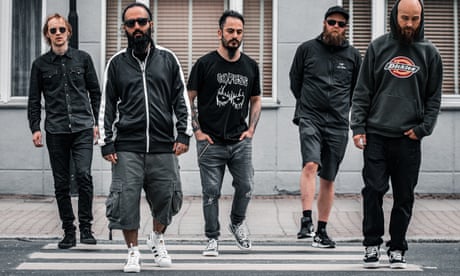Responding to police brutality, hard labour and the threat of nuclear war, members of Sepultura, Holocausto and more explain their decidedly anti-tropical music
Alex Deller
THE GUARDIAN


Tue 26 Sep 2023

‘Our songs were considered bad and poorly played, but there was a scene of headbangers who adored us’ … Zhema and Angel of Vulcano. Photograph: Courtesy of Marcelo R Batista
Heavy metal has always revelled in its us-against-the-universe attitude, remaining steadfast in the face of hostility and outright ridicule; its bands were often born in the shadow of industrial decline, recession or the cold war. Few, though, can claim to have faced the struggles of Brazil’s early extreme metal acts, as their country emerged from a 21-year military dictatorship where poverty, torture and hopelessness were the norm.
“The Brazil of girls and coconuts and paradise beaches existed, but not in our reality,” says Max Cavalera of Sepultura, who remain the country’s most famous heavy metal export. “Our Brazil was dirty and grey and all it offered was crime, drugs or fucked-up factory jobs. We wanted music that made sense to us as young, pissed-off Brazilian kids.”
Pooling resources and sharing or stealing instruments, acts like Sepultura, Sarcófago, Vulcano, Holocausto and Chakal took inspiration from groundbreaking overseas acts like Venom, Hellhammer and Discharge, kicking against a repressive church and state with feral and often blasphemous attempts to emulate their heroes. The scene is now documented in a mammoth 528-page book – United Forces: An Archive of Brazil’s Raw Metal Attack, 1986-1991 – that pools the work of Marcelo R Batista, whose United Forces fanzine documented it all.

Heavy metal has always revelled in its us-against-the-universe attitude, remaining steadfast in the face of hostility and outright ridicule; its bands were often born in the shadow of industrial decline, recession or the cold war. Few, though, can claim to have faced the struggles of Brazil’s early extreme metal acts, as their country emerged from a 21-year military dictatorship where poverty, torture and hopelessness were the norm.
“The Brazil of girls and coconuts and paradise beaches existed, but not in our reality,” says Max Cavalera of Sepultura, who remain the country’s most famous heavy metal export. “Our Brazil was dirty and grey and all it offered was crime, drugs or fucked-up factory jobs. We wanted music that made sense to us as young, pissed-off Brazilian kids.”
Pooling resources and sharing or stealing instruments, acts like Sepultura, Sarcófago, Vulcano, Holocausto and Chakal took inspiration from groundbreaking overseas acts like Venom, Hellhammer and Discharge, kicking against a repressive church and state with feral and often blasphemous attempts to emulate their heroes. The scene is now documented in a mammoth 528-page book – United Forces: An Archive of Brazil’s Raw Metal Attack, 1986-1991 – that pools the work of Marcelo R Batista, whose United Forces fanzine documented it all.

Igor (left) and Max Cavalera of Sepultura, pictured in 2023.
Photograph: Jim Louvau
Sepultura would slough off their crude, knobbly edges to sell 20m records while shaping the path of thrash, groove and nu metal. Formed in 1984 by teenage brothers Max (vocals, guitar) and Iggor Cavalera (drums), the band wielded their crude material like a medieval weapon. “It was always about attitude over perfection,” says Max. “You don’t know how to play well, you don’t sound that good, but you love what you’re doing. That’s pretty much what got us signed, our attitude.” Switched on to rock’n’roll at a Queen concert, the brothers took in AC/DC and Motörhead – “the gateway drug to the bad shit,” chuckles Max – and then a mix of nascent black metal and hardcore punk. For teenagers who’d lost their father and were facing a bleak, uncertain future, these ugly sounds provided the perfect soundtrack.
For all the anger, Iggor is keen to point out the role naivety and joy had to play in the band’s early days, including painting double AA batteries for makeshift bullet belts: couture of choice for any self-respecting metalhead. “It was tough, but at the same time we had fun doing it,” says Iggor. “It wasn’t that we were hating life. And I think every artist invests way more than you get out. But if you can balance that out where you’re happy enough to continue, then it’s all good.”
This said, the dictatorship remained a chilling memory (“we all knew of at least one person that disappeared,” says Iggor) and police brutality was a constant threat, with every interviewee recounting tales of being stopped, harassed, beaten and threatened. “We used to stay at my aunt’s house in Belo Horizonte,” Max recalls. “Her apartment faced the back of the police station and one of the most vivid memories I have is hearing people being tortured in the night. I couldn’t go to sleep because of their screams, it was fucking horrible. We used to joke with our friends that we were more scared of the police than we were the devil. They really scared us, because you could get dragged into the back of a police car and nobody would ever see you again.”
Sepultura would slough off their crude, knobbly edges to sell 20m records while shaping the path of thrash, groove and nu metal. Formed in 1984 by teenage brothers Max (vocals, guitar) and Iggor Cavalera (drums), the band wielded their crude material like a medieval weapon. “It was always about attitude over perfection,” says Max. “You don’t know how to play well, you don’t sound that good, but you love what you’re doing. That’s pretty much what got us signed, our attitude.” Switched on to rock’n’roll at a Queen concert, the brothers took in AC/DC and Motörhead – “the gateway drug to the bad shit,” chuckles Max – and then a mix of nascent black metal and hardcore punk. For teenagers who’d lost their father and were facing a bleak, uncertain future, these ugly sounds provided the perfect soundtrack.
For all the anger, Iggor is keen to point out the role naivety and joy had to play in the band’s early days, including painting double AA batteries for makeshift bullet belts: couture of choice for any self-respecting metalhead. “It was tough, but at the same time we had fun doing it,” says Iggor. “It wasn’t that we were hating life. And I think every artist invests way more than you get out. But if you can balance that out where you’re happy enough to continue, then it’s all good.”
This said, the dictatorship remained a chilling memory (“we all knew of at least one person that disappeared,” says Iggor) and police brutality was a constant threat, with every interviewee recounting tales of being stopped, harassed, beaten and threatened. “We used to stay at my aunt’s house in Belo Horizonte,” Max recalls. “Her apartment faced the back of the police station and one of the most vivid memories I have is hearing people being tortured in the night. I couldn’t go to sleep because of their screams, it was fucking horrible. We used to joke with our friends that we were more scared of the police than we were the devil. They really scared us, because you could get dragged into the back of a police car and nobody would ever see you again.”

Issue two of United Forces fanzine.
Photograph: Courtesy of Marcelo R Batista
This intimidation didn’t just stop at individuals, but also the scene’s burgeoning infrastructure. By now, Sepultura and others had “awakened in other kids the feeling that they could start bands or help promote the metal scene by setting up gigs or running their own fanzines,” says United Forces author Batista. Belo Horizonte’s Cogumelo Records was also key: founded in 1980 by João Eduardo de Faria and his wife, Patty, the shop catered to the area’s growing hoard of metalheads and later morphed into an influential label. Cogumelo Produções released Sepultura’s earliest material and, in 1986, the classic Warfare Noise compilation, which gave the world outside Minas Gerais its first bitter taste of Chakal, Mutilator, Holocausto and Sarcófago. By then, democracy was settling in, but de Faria faced “severe censorship of the lyrics of the songs, and our store was the target of constant police raids looking for evidence of drug use.”
If some were harassed for merely looking like troublemakers or dissidents, others like Vulcano practically begged for interference. A São Paulo band with its roots in Brazil’s 70s hard rock scene, the band’s sawtoothed thrash proved highly influential. “Vulcano was considered an ugly duckling at the time,” says bassist Zhema Rodero. “Our songs were considered bad and poorly played, but there was a scene of headbangers who adored us. We started playing around São Paulo and those were totally insane gigs: just the audience and the band, no barriers, security, roadies, nothing! At the time our drummer used two human tibias to play, the singer’s microphone was clamped on to a human femur and we spread human bones onstage. That caused us some huge problems.”
Back in Minas Gerais, another Cogumelo band were courting their own controversies. Beginning as Asmodeu in 1984 before transitioning into Holocausto, the band’s Campo De Extermínio debut confronted the horrors of Nazi Germany, and its crude, borderline-childlike sleeve remains gut-churning to this day. “It was a crushing time for the Brazilian population,” says vocalist Rodrigo Magalhães, a heavy metal lifer who has served with the likes of Impurity and, now, Tormentador. “In geopolitical terms, we lived on the verge of a nuclear war. We didn’t know if there would be tomorrow, so what we wanted was to fuck with everything, all the time. We had no pretensions and no specific purposes beyond screaming and shocking to the fullest. We had no political conscience or knowledge. Through music, we tried to show the horrors of war. Among all miseries, the scourge of war is one of the most absurd and terrifying.”
While Rodrigo views Holocausto as a “cursed band,” often loathed for its controversial themes and imagery, Cogumelo’s João Eduardo remains more philosophical when it comes to the work of his early charges. “All of the Warfare Noise bands were heavily criticised,” he says. “The names of the bands themselves were controversial, and we had a lot of criticism trying to distribute the products. But Holocausto depicted an illusion-free view of the real world and warned that nothing changes. Just look at the world today – fascism is coming back.” Jair Bolsonaro’s 2019-2022 presidency mirrored similar populist shifts in the US, UK and swathes of Europe. “He brought back every nightmare and stupidity of those horrible years of dictatorship,” says Batista. “The Bolsonaro years were like a bad trip into hypocrisy and bigotry, not to mention the corruption cases, crimes against nature and the lack of respect for those who died during the worst days of the pandemic.”
The protean recordings, photoshoots and album sleeves snapshotted by United Forces would later be championed by influential second wave black metal acts outside Brazil such as Darkthrone, Mayhem and Blasphemy, and they remain touchstones for many fans seeking raw, untamed sound.
But many of those involved continue to look forward as well as backwards. Cogumelo has celebrated 40 years of operation, while Marcelo’s early fanzine set him on a path that would take him from working in a steel mill to founding a record label (releasing music by overseas acts he’d championed in United Forces, such as Fear of God and Agathocles) and Extreme Noise Discos, the record shop he runs with his wife in downtown São Paulo. While no longer members of the band they formed, Max and Iggor Cavalera remain deeply connected to their earliest material, rerecording and touring (under the name Cavalera) the songs from 1985’s Bestial Devastation and 1986’s Morbid Visions, still savage but now more audible and in-tune.

‘I got 12 years and 74 lashes’: Confess, the band jailed for playing metal in Iran
Max has never stopped exploring audio brutality, his sons Zyon and Igor continue the Cavalera dynasty in the bands Soulfly and Go Ahead and Die, and Iggor performs as one half of extreme electronic duo Petbrick. “I didn’t realise how political the Brazilian metal scene was at the time,” he says of the early days that forged him. “There was a lot of resistance. I think everyone that participated should be proud, because we had to build something from nothing and we opened a lot of doors. Now, if you hear about a Brazilian band, you’re not surprised. But I remember people laughing, saying ‘they’re in the jungle, there’s no music there!’ So the bands, the tape traders, promoters and fanzine writers made that scene, and it was important.”
United Forces: An Archive of Brazil’s Raw Metal Attack, 1986-1991 is published by Bazillion Points
This intimidation didn’t just stop at individuals, but also the scene’s burgeoning infrastructure. By now, Sepultura and others had “awakened in other kids the feeling that they could start bands or help promote the metal scene by setting up gigs or running their own fanzines,” says United Forces author Batista. Belo Horizonte’s Cogumelo Records was also key: founded in 1980 by João Eduardo de Faria and his wife, Patty, the shop catered to the area’s growing hoard of metalheads and later morphed into an influential label. Cogumelo Produções released Sepultura’s earliest material and, in 1986, the classic Warfare Noise compilation, which gave the world outside Minas Gerais its first bitter taste of Chakal, Mutilator, Holocausto and Sarcófago. By then, democracy was settling in, but de Faria faced “severe censorship of the lyrics of the songs, and our store was the target of constant police raids looking for evidence of drug use.”
If some were harassed for merely looking like troublemakers or dissidents, others like Vulcano practically begged for interference. A São Paulo band with its roots in Brazil’s 70s hard rock scene, the band’s sawtoothed thrash proved highly influential. “Vulcano was considered an ugly duckling at the time,” says bassist Zhema Rodero. “Our songs were considered bad and poorly played, but there was a scene of headbangers who adored us. We started playing around São Paulo and those were totally insane gigs: just the audience and the band, no barriers, security, roadies, nothing! At the time our drummer used two human tibias to play, the singer’s microphone was clamped on to a human femur and we spread human bones onstage. That caused us some huge problems.”
Back in Minas Gerais, another Cogumelo band were courting their own controversies. Beginning as Asmodeu in 1984 before transitioning into Holocausto, the band’s Campo De Extermínio debut confronted the horrors of Nazi Germany, and its crude, borderline-childlike sleeve remains gut-churning to this day. “It was a crushing time for the Brazilian population,” says vocalist Rodrigo Magalhães, a heavy metal lifer who has served with the likes of Impurity and, now, Tormentador. “In geopolitical terms, we lived on the verge of a nuclear war. We didn’t know if there would be tomorrow, so what we wanted was to fuck with everything, all the time. We had no pretensions and no specific purposes beyond screaming and shocking to the fullest. We had no political conscience or knowledge. Through music, we tried to show the horrors of war. Among all miseries, the scourge of war is one of the most absurd and terrifying.”
While Rodrigo views Holocausto as a “cursed band,” often loathed for its controversial themes and imagery, Cogumelo’s João Eduardo remains more philosophical when it comes to the work of his early charges. “All of the Warfare Noise bands were heavily criticised,” he says. “The names of the bands themselves were controversial, and we had a lot of criticism trying to distribute the products. But Holocausto depicted an illusion-free view of the real world and warned that nothing changes. Just look at the world today – fascism is coming back.” Jair Bolsonaro’s 2019-2022 presidency mirrored similar populist shifts in the US, UK and swathes of Europe. “He brought back every nightmare and stupidity of those horrible years of dictatorship,” says Batista. “The Bolsonaro years were like a bad trip into hypocrisy and bigotry, not to mention the corruption cases, crimes against nature and the lack of respect for those who died during the worst days of the pandemic.”
The protean recordings, photoshoots and album sleeves snapshotted by United Forces would later be championed by influential second wave black metal acts outside Brazil such as Darkthrone, Mayhem and Blasphemy, and they remain touchstones for many fans seeking raw, untamed sound.
But many of those involved continue to look forward as well as backwards. Cogumelo has celebrated 40 years of operation, while Marcelo’s early fanzine set him on a path that would take him from working in a steel mill to founding a record label (releasing music by overseas acts he’d championed in United Forces, such as Fear of God and Agathocles) and Extreme Noise Discos, the record shop he runs with his wife in downtown São Paulo. While no longer members of the band they formed, Max and Iggor Cavalera remain deeply connected to their earliest material, rerecording and touring (under the name Cavalera) the songs from 1985’s Bestial Devastation and 1986’s Morbid Visions, still savage but now more audible and in-tune.

‘I got 12 years and 74 lashes’: Confess, the band jailed for playing metal in Iran
Max has never stopped exploring audio brutality, his sons Zyon and Igor continue the Cavalera dynasty in the bands Soulfly and Go Ahead and Die, and Iggor performs as one half of extreme electronic duo Petbrick. “I didn’t realise how political the Brazilian metal scene was at the time,” he says of the early days that forged him. “There was a lot of resistance. I think everyone that participated should be proud, because we had to build something from nothing and we opened a lot of doors. Now, if you hear about a Brazilian band, you’re not surprised. But I remember people laughing, saying ‘they’re in the jungle, there’s no music there!’ So the bands, the tape traders, promoters and fanzine writers made that scene, and it was important.”
United Forces: An Archive of Brazil’s Raw Metal Attack, 1986-1991 is published by Bazillion Points
No comments:
Post a Comment